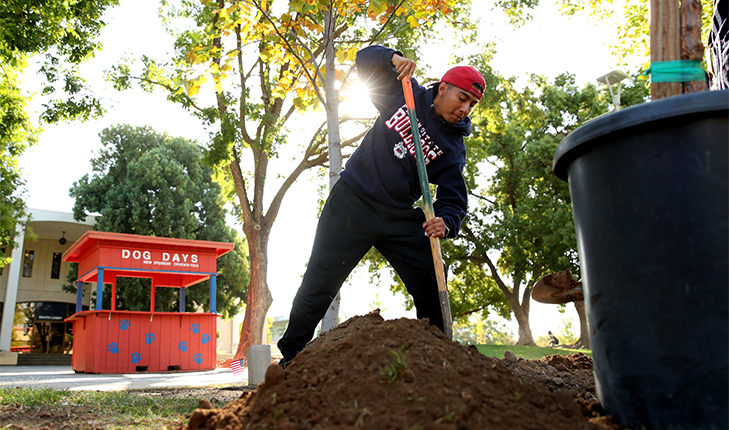Macie Saiz was looking forward to spending the spring 2020 semester back on the Fresno State campus after a semester studying abroad in Thailand. She had a great lineup of finance classes with professors that she admired, and she just started a service-learning project at the Valley Dream Center in Fresno.
Then, the COVID-19 pandemic hit, forcing classes to go virtual, community service initiatives to be canceled and many service-learning projects, including Saiz’s, to come to an end.
“What now?” Saiz thought. The service project was a critical part of Fresno State’s Mary E. McGarry Student Loan Fund, which provided Saiz with a low-interest loan to help cover her college expenses. Some or all of the loan can be forgiven if students take a community service course and complete a service project through the University’s Jan and Bud Richter Center for Community Engagement and Service-Learning.
“It made me feel so good to be part of the community,” Saiz said about helping Fresno residents with tax preparation through the Valley Dream Center. She was also excited to work with children in a Saturday morning sports program once tax season was over. When her project abruptly ended, Saiz reached out to Richter Center director Chris Fiorentino to see what else she could do. “I’m open for anything. Anything you want to do, give it to me,” she said.
Saiz, a finance major from Fresno who expects to graduate this fall, is one of thousands of Fresno State students, faculty and staff who provide service hours to the community every year. Despite the pandemic putting a halt to many service initiatives this spring, the University still provided a total of 1.2 million hours, according to the Service Impact on the Community Report by the Richter Center. This is the 11th year in a row that Fresno State has provided more than 1 million hours of service.
The estimated economic impact of these hours is $38.8 million based on calculations from the Independent Sector, a national nonpartisan network of nonprofit and philanthropic organizations and professionals. The 2018 value of an hour of volunteer time in California was $29.95, according to the network. The 2019 value, which is calculated using government data, is delayed due to the pandemic.
“Despite the unprecedented impacts that the coronavirus had on normal campus operations and on our community partners, Fresno State continued to selflessly serve. Ultimately, the campus community provided a total of 1.27 million hours of service this year,” Fiorentino said.
Highlights of this year’s report include an increase in the number of faculty and staff service hours, and the coronavirus-related service initiative from the Lyles College of Engineering to develop personal protective equipmentfor Valley health care workers.
Then, there were students like Saiz who found an alternative project to complete while juggling virtual classes. She worked with Fiorentino on an independent assignment to develop a resource list of fun and educational activities for people and families sheltering in place.
“I did tons of research. I just kind of started building ideas and started working with it,” Saiz said. “There was so much I learned about. I tried to think nationally, globally, [and include] a children’s section, adult section, entertainment … I wanted things to keep people active, keep them positive.”
The resource list was distributed across campus and posted on the Richter Center and Fresno State Department of Recreation Administration websites.
The Richter Center is responsible for coordinating the University’s community engagement and service-learning efforts. In August 2007, Jan and Bud Richter pledged to provide $3.5 million to establish the center based on the Richters’ belief that it would “instill in students a lifelong character trait of giving to the community.”
The center works closely with other Fresno State programs and departments also involved in community engagement such as the Humanics Program at Fresno State, Community Service Scholarship Program and the Scholars in Service Program. Additionally, the Richter Center partners with about 200 community benefit organizations across the Central Valley.
For more information about the Richter Center, contact Fiorentino at chrisf@csufresno.edu or 559.278.8848.





